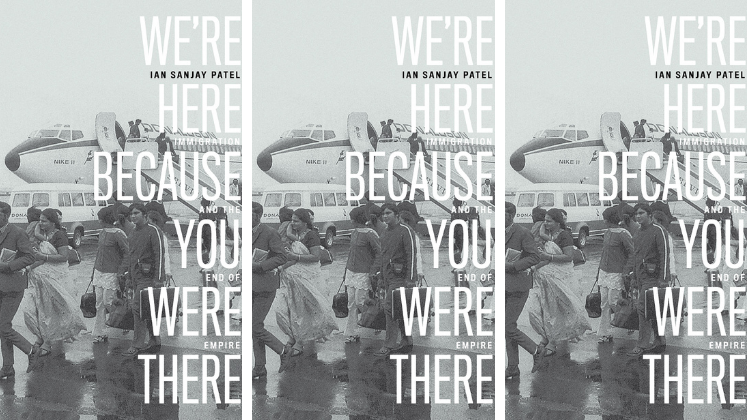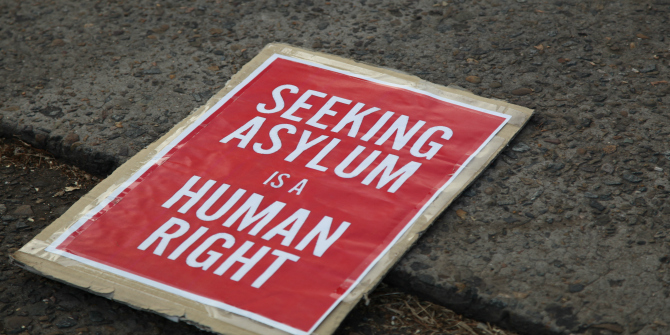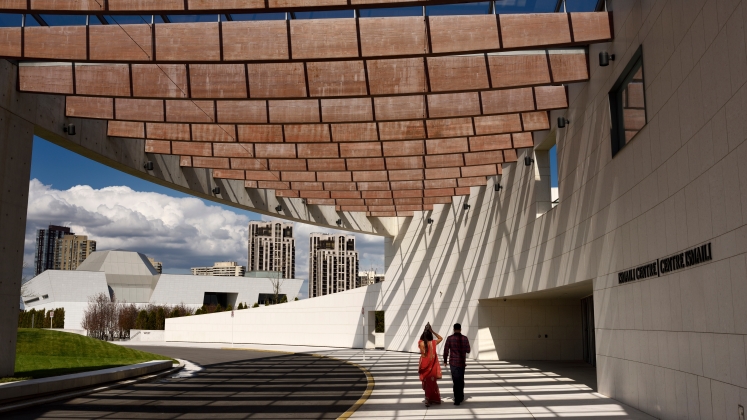On Thursday 13 June, an event, The Drama of Displacement: The Journey of a Syrian Refugee Through Theatre, took place as part of LSE Festival 2024. It involved a staged a reading from a new play by Nesrin Alrefaai and Matthew Spangler, A Handful of Lentils, which shares the intertwined stories of two women, a Syrian refugee and a Home Office official, both grappling with personal tragedies and the challenges of their lives in the UK.
Zainab Mehdi attended the event and spoke to playwright Nesrin Alrefaai. Below, she shares insight into the play and the power of theatre to tell stories that centre refugees’ lives, explore the politics of immigration and connect with audiences.

From June 10 to 15, 2024, the London School of Economics and Political Science hosted LSE Festival, exploring how power and politics shape our world. One event, The Drama of Displacement: The Journey of a Syrian Refugee Through Theatre, showcased a staged reading from an upcoming play by Nesrin Alrefaai and Matthew Spangler. This was followed by a panel discussion with the playwrights, chaired by Dr. Michael Mason, director of the LSE Middle East Centre, and concluded with an audience Q&A session. Their play, A Handful of Lentils, explores the politics and human experiences of forced migration.

The title comes from a popular saying in the Levant: “Those who know, know, and those who do not know say ‘A handful of lentils.'” This saying originates from a tale about a young couple entangled in a forbidden romance in a village. To cherish their time together and express their love, they secretly and frequently meet on a rooftop under the pretence of cleaning and preparing lentils.
The girl’s father, believing her cousin capable of ensuring a prosperous and comfortable life for her, had arranged their marriage; however, one day he discovered their secret meetings. The young man, frightened, ran away with a handful of lentils still in his hand. The father chased him through the village, causing confusion among the residents. They wondered what the young man had done to deserve such a pursuit. Some speculated that it was simply because he stole a handful of lentils.
Throughout history and even today, this proverb is used to describe situations where the truth is oversimplified or misunderstood. That’s why Alrefaai and Spangler chose this title for their upcoming play, a metaphor to highlight how major issues are reduced to trivial matters, exemplified by one character’s journey from Syria to the UK.
Exploring migration
The play centres on Layla, a Syrian refugee, and Sophie, a UK Home Office officer. Told in the first person, each character shares their own story, a narrative choice that Alrefaai describes as a way to humanise complex issues. During the reading, Layla’s scenes were performed by Raghad Chaar, while Roxy Faridany portrayed Sophie. Faridany has previously appeared in Alrefaai’s and Spangler’s 2023 play, The Beekeeper of Aleppo, an adaptation of the best-selling 2019 novel by Christy Lefteri.
Both Layla and Sophie grapple with personal tragedies, navigating their lives against the backdrop of the UK’s politics, particularly in the Home Office in Croydon. Croydon serves as one of the initial points of entry for asylum seekers, with Lunar House being a key location for starting asylum claims.
Layla and Sophie grapple with personal tragedies, navigating their lives against the backdrop of the UK’s politics, particularly in the Home Office in Croydon.
The reading begins with the song ”Ala Mouj al Bahr” by Syrian singer Lena Shamamian played on YouTube, setting the stage deeply for Layla’s story. The song, translating to “On the Waves of the Sea” in Arabic, vividly reveals Layla’s hardship: losing her mother at sea during a dangerous boat journey from Syria to the UK.
Just when the audience thinks Layla couldn’t have faced more hardship, we learn that her father has died as well. Despite these immense challenges, Layla’s determination to create a better future for herself becomes evident. This determination shines through during her Home Office interview. Layla hopes the officer will understand her story, but she’s warned not to reveal everything. Saying the “wrong” thing could lead to deportation. Instead, she’s advised to carefully choose what to share to present herself as the “ideal refugee.”
Saying the ‘wrong’ thing could lead to deportation. Instead, she’s advised to carefully choose what to share to present herself as the ‘ideal refugee’.
Layla, like many refugees and asylum seekers, needs to present a cohesive story to be granted asylum. In a way, this suggests that the officer is merely ‘”ticking boxes”, leaving no room for emotions. As an audience, we can’t help but ask with frustration: Aren’t we all human, regardless of our circumstances, prone to mistakes in our past? Who are we to judge and decide who deserves a chance at a better life? These questions are further provoked by a line from the text: “This island will crumble if we welcome more refugees.” But is that truly the case?
Such statements serve as stark reminders of the harsh and inhumane immigration policies that have emerged in the UK in recent years, such as the Rwanda immigration policy. “Some immigration plans, like the Rwanda scheme, are ideal for front-page news. They spark debates about ethics and logistics, creating a distraction from the real issues at hand. The play invites conversations about necessary social engagement,” says Alrefaai.
Immigration plans, like the Rwanda scheme, are ideal for front-page news. They spark debates about ethics and logistics, creating a distraction from the real issues at hand.
The tables turn
While navigating her immigration status with the Home Office, we learn that Layla works at Poundland. Layla knows this is temporary until she secures her dream of receiving a scholarship to study medicine at the University of Cambridge. Despite not being in her ideal situation, Layla does not complain, even after losing all her ID documents in the Grenfell fire, fully aware that this could complicate her application. Her composure highlights the resilience of immigrants and refugees, challenging prevalent stereotypes.
Sophie, on the other hand, doesn’t complain but continually and tirelessly explains the current situation in the UK, emphasising the challenges posed by inadequate services, the rising cost of living and inflation. She criticises those receiving government benefits and laments that she and her children must resort to eating beans on toast at the end of each month, just before the next paycheck arrives. Her conclusion, which blames immigrants, mirrors the government’s rhetoric.
Her struggles push her to apply for a second job, leading her to seek an assistant manager role at Poundland – Layla’s current position, which she is leaving after being awarded the much-awaited scholarship. Alrefaai said she drew inspiration for Sophie’s struggles from the 2020 documentary Universal Credit: Inside the Welfare State, about a UK civil servant who applied for a second job to make ends meet. To her surprise, Sophie goes to her interview at Poundland and is shocked to find herself being interviewed by Layla, the very woman she had interviewed during her immigration application. “The interaction between the refugee and the state official serves as a microcosm of the broader political landscape. This dramatisation humanises abstract immigration policies and highlights the personal struggles and resilience of those involved,” states Alrefaai.
The interaction between the refugee and the state official serves as a microcosm of the broader political landscape.
While some might react with “Ha! In your face!”, others may empathise with Sophie’s circumstances. In the play, she isn’t meant to be seen as the villain. Sophie is genuinely caring, but she’s constrained by the system, of which she is unfortunately a by-product. At the play’s close, the same song from the beginning is played, accompanied by the charming guitar strings of LSE MEC communications manager Jack McGinn. This time, the song is sung by British-Jordanian actress Lara Sawalha.
Theatre holds immense value in telling stories like this and dramatising displacement. Through the power of storytelling, theatre can enable wide audiences to empathise with refugees and others involved in the systems that control immigration. The discussion between the panellists and the audience fostered meaningful engagement, aligning perfectly with the play’s intended impact. The audience recognised the need for authentic voices to tell their stories, highlighting the importance of representation. The close relationships between characters also reflect the UK’s social and political climate and our interconnected fates within this country. The play encourages the audience to look beyond mainstream narratives in the media, prompting them to think about real issues and start asking questions.
Note: This review gives the views of the author and not the position of the LSE Review of Books blog, nor of the London School of Economics and Political Science.
Image credit: Pete Maclaine on Shutterstock.








wonderful and rich in complexity.Sp glad to find you here!Meridel